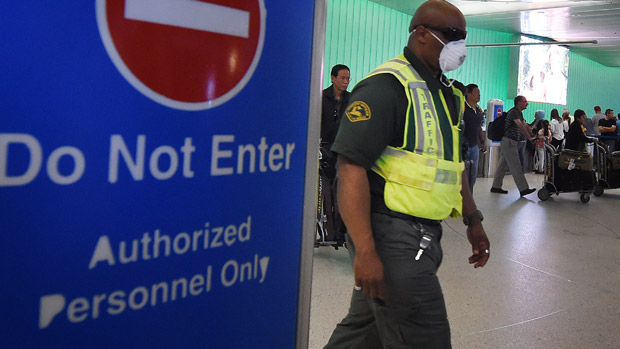'Ebola racism': how the world is discriminating against Africans
From schools to borders, 'hysteria' surrounding the Ebola virus is leading some to shun contact with Africans

A free daily email with the biggest news stories of the day – and the best features from TheWeek.com
You are now subscribed
Your newsletter sign-up was successful
Increasing anxiety and fear over the Ebola virus has led to what many commentators have dubbed "Ebola racism".
"People are being shunned and mocked for having visited, or even for simply having been born in, Africa – and anywhere in Africa will do, afflicted with Ebola or not," writes The Intercept's Andrew Jones.
He argues that the "hysteria" surrounding the virus in the West is an example of "ignorant discrimination that immigrants in general and Africans specifically have endured for decades".
The Week
Escape your echo chamber. Get the facts behind the news, plus analysis from multiple perspectives.

Sign up for The Week's Free Newsletters
From our morning news briefing to a weekly Good News Newsletter, get the best of The Week delivered directly to your inbox.
From our morning news briefing to a weekly Good News Newsletter, get the best of The Week delivered directly to your inbox.
So, how are Africans being discriminated against?
In everyday life
A young Guinean football player was driven off the pitch in Pennsylvania following chants of "Ebola" from the opposing team. "There were tears coming down his eyes," his guardian told ABC news. He was "visibly shaken" because he still has family in the region and fears for their safety, he added. Other African immigrants speak of people moving seats on buses and trains because of their skin colour and accent or refusing to shake their hands.
In education
A free daily email with the biggest news stories of the day – and the best features from TheWeek.com
In the US, Navarro College rejected applications from Nigerian students due to Ebola fears, even though the country has since been declared Ebola-free. Several people also pointed out that Texas had had more cases of the Ebola virus than Nigeria in that week. The college said in a statement: "At this time, we believe it is the responsible thing to do to postpone our recruitment in those nations that the Centres for Disease Control and the US State Department have identified as at risk."
Even though #Nigeria has no current case of #Ebola, a US College is denying admission to Nigerians on that basis. pic.twitter.com/aRekeGRVRu— Idris Ayodeji Bello (@idrisayobello) October 12, 2014
Closer to home, a school in Stockport banned a healthy nine year old boy from attending class because he was from Sierra Leone. His mother told the Daily Telegraph it was the result of a "wave of hysteria" from "ignorant parents". She said: "We've been met with leper-type attitudes from wealthy people overreacting and trying to protect themselves from a threat which isn't there."
When house-hunting
A student from Sierra Leone was refused accommodation by two Norwich landlords due to Ebola fears, The Guardian reports. The refusal letter he received read: "Under normal circumstance[s] your profile would be a great profile to be one of our lodgers. However [due to the] epidemic, we have decided not to accept anyone that has been anywhere near the outbreak."
When travelling
Several countries, including Jamaica and Colombia have closed their borders to anyone arriving from Sierra Leone, Liberia or Guinea. Republicans in the US are calling for Obama to do the same in order to "protect the nation", despite contradictory advice from global health bodies which say such efforts will only serve to worsen the situation. The UN's chief said such measures were an example of anti-African prejudice, the New York Times reports.
-
 The environmental cost of GLP-1s
The environmental cost of GLP-1sThe explainer Producing the drugs is a dirty process
-
 Greenland’s capital becomes ground zero for the country’s diplomatic straits
Greenland’s capital becomes ground zero for the country’s diplomatic straitsIN THE SPOTLIGHT A flurry of new consular activity in Nuuk shows how important Greenland has become to Europeans’ anxiety about American imperialism
-
 ‘This is something that happens all too often’
‘This is something that happens all too often’Instant Opinion Opinion, comment and editorials of the day
-
 Epstein files topple law CEO, roil UK government
Epstein files topple law CEO, roil UK governmentSpeed Read Peter Mandelson, Britain’s former ambassador to the US, is caught up in the scandal
-
 Iran and US prepare to meet after skirmishes
Iran and US prepare to meet after skirmishesSpeed Read The incident comes amid heightened tensions in the Middle East
-
 Israel retrieves final hostage’s body from Gaza
Israel retrieves final hostage’s body from GazaSpeed Read The 24-year-old police officer was killed during the initial Hamas attack
-
 China’s Xi targets top general in growing purge
China’s Xi targets top general in growing purgeSpeed Read Zhang Youxia is being investigated over ‘grave violations’ of the law
-
 Panama and Canada are negotiating over a crucial copper mine
Panama and Canada are negotiating over a crucial copper mineIn the Spotlight Panama is set to make a final decision on the mine this summer
-
 Why Greenland’s natural resources are nearly impossible to mine
Why Greenland’s natural resources are nearly impossible to mineThe Explainer The country’s natural landscape makes the task extremely difficult
-
 Iran cuts internet as protests escalate
Iran cuts internet as protests escalateSpeed Reada Government buildings across the country have been set on fire
-
 US nabs ‘shadow’ tanker claimed by Russia
US nabs ‘shadow’ tanker claimed by RussiaSpeed Read The ship was one of two vessels seized by the US military